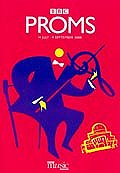
Prom Review

Prom Review
PROM 1: COPLAND, BACH/STOKOWSKI, RACHMANINOV &
JANACEK, RAH, 14 July 2000 (MB)
The opening Prom concert dispensed with the usual big choral piece that traditionally opens the first night (well it is a new Millennium) and programmed instead a first half of popular works with a second half devoted to just one large scale work, the Glagolitic Mass.
Two anniversaries celebrated at this years concerts, those of Copland and Bach, provided the raison d'etre for the first two works. Copland's Fanfare for the Common Man etched its brass sound across the vast spaces of the Albert Hall like a darkening eclipse. From its solitary opening to its closing panoply of trombones and tuba it cast its spell - as it should. The BBC Symphony brass were security itself.
Stokowski's arrangement for Bach's Toccata and Fugue used the spaces of the Albert Hall to recreate the cathedral of sound this work so heavily depends on. Sir Andrew Davis is no Stokowski on the podium, and in some ways this was the reason the performance lacked that one essential ingredient: drama. The BBC strings were suitably opulent, but a willingness to free-bow more often would have enhanced this impression even more. One wistfully longs for the day when a major orchestra will just free-wheel through this arrangement.
The first half ended with the ever-popular Evgeny Kissin as soloist in Rachmaninov's Second Piano Concerto. Kissin comes on stage with a severity ill-suited to a man of his age, but this performance found him in better form than I have heard of late. Technically, this was an unrivalled account, with fingerwork of awesome precision, and cross-handed playing that defied belief. I found an extra passion to his playing that others did not - something of a rarity in a Kissin performance nowadays. The second movement did genuinely move, although I can understand how for some the intimacy of this work can so easily be lost in a hall the size of the Albert Hall. Encores follow in a Kissin concert with tiresome inevitability - but the G minor and B flat major Preludes were played with fire and dash.
Janacek's Glagolitic Mass is a work of dynamic contrasts. There are rapt, inner moments and, as a foil, great brass fanfares that dramatically underscore the work's development. There is a quartet of soloists, none of whom really dominate the work , but each is integral to a successful performance. Christine Brewer (soprano) neither shrieked nor wobbled (a virtue difficult to overestimate in this work), whilst the chorus was suitably full-throated and comfortable with the unfamiliar Czech idiom. "I felt a cathedral grow out of woods", wrote Janacek on the impulse to write the Mass. It could have been written with this performance in mind - blazing under Andrew Davis' baton like a smouldering inferno.
Marc Bridle
Seen&Heard is part of Music on the Web(UK) Webmaster: Len Mullenger Len@musicweb-international.com
Return to: Seen&Heard Index
 Return to:
Music on the Web
Return to:
Music on the Web